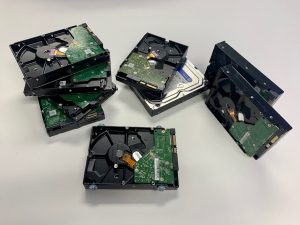 Computer storage has evolved over the years - from small capacity drives to PCIe-based solid state drives (SSDs). There are now more storage options available to us than ever before, but what is the right storage solution for your computers? With new hard drive options that increase read and write speeds, better overall performance, and more efficient storage capacity, there are many options to consider for what is best for your home or office.
Computer storage has evolved over the years - from small capacity drives to PCIe-based solid state drives (SSDs). There are now more storage options available to us than ever before, but what is the right storage solution for your computers? With new hard drive options that increase read and write speeds, better overall performance, and more efficient storage capacity, there are many options to consider for what is best for your home or office.
In order to store information like programs, pictures, documents, email, and a slew of other data, computers require a hard drive. A hard drive is a piece of hardware that stores this data until the computer needs to display it. Data that’s stored on your hard drive is idle until it’s needed where it is then loaded into RAM and accessible by the CPU.
With different forms of storage available for your computer, you may be wondering if you should purchase a computer that comes with an SSD or upgrade your current hard drive to another one that offers better performance.
What are the Different Storage Options and Their Advantages?
Spinning Hard Disk Drive – These are the drives that most computers use and store information on today. A hard drive uses spinning disk platters internally to store information. Most of these hard drives come in a standard 3.5” but can also be 2.5” in order to fit into smaller devices, like laptops, for example. These drives spin a disk at varying speeds which can differ from 5400 RPMs, up to as high as 10,000 RPMs. Standard 3.5” drives are typically found in 7200 RPM models and can perform roughly 100 read/write operations per second.
This storage option is cheaper and is useful for storing non-application-based data such as pictures, documents, email, or other information of the like. There are better hard drive options for installing applications on, however, like SSDs. Although performance is significantly slower than an SSD, these hard drives are still useful in mass storage operations, like on file servers, or on a NAS (Network Attached Storage) device, like a QNAP.
Solid State Drive (SSD) – These drives store data on NAND cells. Unlike hard drives that use a physically spinning disk, SSDs have no moving parts. These drives only come in 2.5” size which makes them suitable for devices, like laptops, but they can also be installed in regular desktop computers with a drive cradle.
Because SSDs don’t need to physically move a disk into position to read data, they are capable of much faster input and output operations offering read and write speeds of around 500 operations per second.
M.2 NVMe Drives – Non-Volatile Memory Express, or NVME, hard drives are also solid state drives with a key difference from other non-NVMe-based SSDs. Where a typical SSD or non-SSD-based drive connects to your computer with a SATA cable, M.2 NVMe drives do not. Instead, they connect directly to a specialized slot designed specifically for these types of drives. When these drive types are connected to your computer’s motherboard directly, it eliminates the bottleneck for read and write operations that is created with the cable. Since the drive is connected directly, these drives can get up to 3500 MB/s, significantly faster than other SSD and non-SSD based hard drives.
These drives, however, require a special connection to work with most computers. More motherboards are starting to include these connection ports for NVMe drives, but older computers likely will not have this option available.
Because these drives are so compact, they are more expensive than other drive types. It is a good idea when thinking about using an NVMe-based drive to pair it with a larger capacity HDD so that you can install applications on the NVMe drive and use the spinning drive for storage of music, documents, or other non-application-based data.
Whenever you’re looking to purchase or upgrade your computers data storage components, it’s best to work with an expert, like Natural Networks. Natural Networks is a managed IT services provider with experts who can help you decide what storage solution is best for your computers. If you want to learn more, give us a call today!



